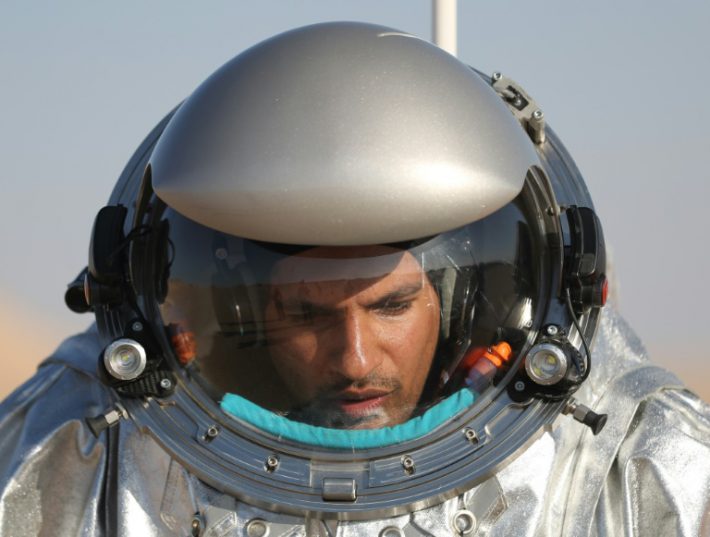Behind a barbed wire fence protected by soldiers from the Gulf sultanate, researchers in prefab facilities work away on experiments that include trying to grow vegetables in inhospitable terrain chosen for its resemblance to the red planet.
Run by the Austrian Space Forum, a mainly volunteer collective, with the backing of the Omani government, the AMADEE-18 Mars Analog Mission has brought together researchers, inventors, space professionals and enthusiasts.

A member of the AMADEE-18 Mars simulation mission on February 7, 2018 conducts scientific experiments during the project in Oman’s Dhofar desert
For decades the realm of science fiction, sending a manned mission to Mars is now the stated — albeit still distant — goal of the US government and entrepreneurs.
On Tuesday US billionaire Elon Musk launched the world’s most powerful rocket — the SpaceX Falcon Heavy — towards an orbit near Mars.
In this remote corner of the Arabian Peninsula’s Dhofar desert, the European-led project may be far less flashy — but it is still looking to answer major questions.
“Once we go to Mars, and stay on Mars, we will have to use the resources we find on Mars because we cannot bring everything from Earth,” forum president Alexander Soucek said.
“So we have to use the things we find there: first of all to sustain life there, to sustain missions there, and then in the longer run maybe also for other things.”
– ‘Responsibly and ethically’ –
The Austrian Space Forum does not have a rocket like Musk, but its members — many with day jobs at traditional space agencies or private companies — share the entrepreneur’s drive to be innovative.
A member of the AMADEE-18 Mars simulation mission on February 7, 2018 conducts scientific experiments during the project in Oman’s Dhofar desert
In the increasingly crowded field of space exploration, Soucek says the project is carving out a special niche with its Mars simulations.
“We get sponsors from private industry. We collect money, partnerships, invite people to join forces,” he said.
Volunteer researcher Joao Lousada was struggling into a pressure-simulating exoskeleton suit with the help of three technicians.
Weighing more than 50 kilograms (110 pounds), it is custom-built to simulate the constricted movement astronauts would feel on Mars — and takes a gruelling hours-long process just to put on.
Like the other volunteers he watched the Falcon Heavy launch with awe, but he said there were serious issues about the commercialisation of space.
“You can’t claim the moon, you can’t claim asteroids so mining comes into a bit of a legal loophole,” Lousada said.
“But… I think it’s a very interesting idea. I think definitely we should look into using resources from asteroids that are not available on Earth or are less frequent on Earth.”
A member of the AMADEE-18 Mars simulation mission on February 7, 2018 conducts scientific experiments during the project in Oman’s Dhofar desert
Once suited up, Lousada and fellow researcher Kartik Kumar mounted rovers and rode off under the blazing sun to complete their set of experiments in the desert.
Returning before dusk, Kumar — an expert on space debris — reflected on the role and responsibility of space voyagers.
“We should never forget that as we explore our own planet and the solar system we have to do it responsibly and ethically,” said Kumar.
– ‘Tomorrow, perhaps reality’ –
Since 2015, the United States and Luxembourg have moved to the forefront of what has been dubbed the new space race, creating legal frameworks that could eventually allow mining in space.
Members of the AMADEE-18 Mars simulation mission conduct scientific experiments during a project in Oman’s Dhofar desert
The European Union has yet to take a position, as its members are on vastly different pages over the controversial topic.
“Can you just go there and take resources or not?” Soucek said.
“There are a few things you have to sort out from technical and economic and also political point of view. But as always in space, today it’s science fiction. Tomorrow, perhaps reality.”
Download our app and read this and other great stories on the move. Available for Android and iOS.